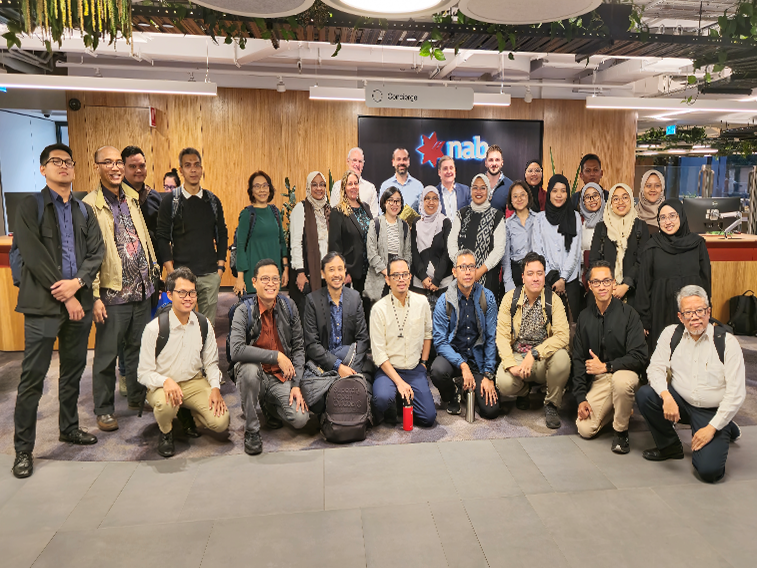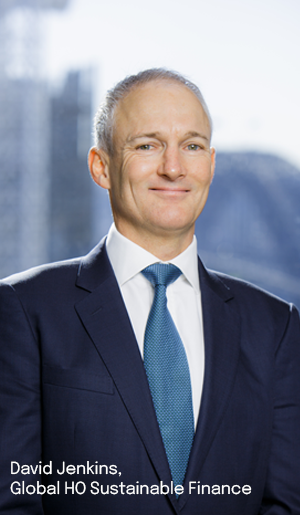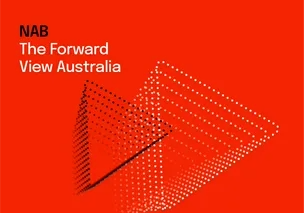21 August 2025
November 26, 2024
NAB shares sustainable finance expertise with Indonesia delegation
As a recognised leader in sustainable finance, NAB recently hosted a group of Indonesian officials visiting Sydney for valuable insights into market experiences and developments in Australia.
By Corporate and Institutional Banking

NAB’s David Jenkins and team have helped advise governments on sustainable financing programs at the federal and state levels in Australia and abroad, including this year’s successful launch of the inaugural $7 billion sovereign green bond.
Fresh from this recent high-level experience, Jenkins was well-placed to host in NAB’s Sydney offices a group of 23 officials visiting from Indonesia, all eager to gain insights into the market trends and developments the bank has seen in its long-standing market involvement.

“Australia is well-regarded as a leader in sustainable debt markets, both for the state of our market development and our ongoing innovation,” says Jenkins, who is NAB’s Global Head of Sustainable Finance for Corporate and Institutional Banking. “Here at NAB, we’ve been active in this market for over 10 years now and we were more than happy to share our learnings along that journey.”
The delegation was visiting as part of the Australia Awards Short Course, Sustainable Finance in Indonesia: Transforming Challenges into Opportunities. The program is offered by the prestigious Australia Awards in Indonesia, opens in new window for emerging leaders selected from the Indonesian Government, state-owned enterprises, and other prominent organisations.
The short course, funded by Australia’s Department of Foreign Affairs and Trade (DFAT) and delivered by the Institute for Sustainable Futures, opens in new window at the University of Technology Sydney (UTS), aims to strengthen international relations and drive economic development.
International impressions
NAB’s guests for the day included representatives from the Ministry of Finance, Ministry of Environment and Forestry, Coordinating Ministry for Maritime Affairs and Investment, Financial Services Authority (OJK), Bank of Indonesia, Indonesia Stock Exchange and PT Perusahaan Listrik Negara (PLN).
Ministry of Finance guest Antonius Dyan Nugrahanto Aji said he was “very impressed” with the visit to NAB which had enabled an “exchange of valuable experiences”.
“While our roles differ—NAB as a financial institution and us as a government body—our commitment to advancing sustainable finance is well-aligned,” he said. “This visit has enriched our understanding of how Australia’s banks engage in sustainable finance and deepened our knowledge of the broader sustainable finance landscape in Australia, providing meaningful insights to support and develop our own green finance initiatives.”
Bayu Adi Taufan from Bank Rakyat Indonesia said NAB had “pioneered innovative approaches to sustainable finance and green investment, setting a high standard in the industry”.
“We were truly pleased to visit NAB and gain valuable insights into their experiences and expertise as a leading bank and green bond issuer,” he said. “This visit was immensely valuable, providing us with practical ideas and inspiration for strategies that could be implemented or adapted within our own institution to better align with global sustainable finance objectives.”
NAB’s Jenkins highlighted the use of best practice guidance for labelled green, social, sustainability and sustainability-linked (GSSS) debt developed by the International Capital Markets Association (ICMA) Principles, together with green bond certification and standards like the Climate Bonds Standard from the Climate Bonds Initiative, to ensure investor needs for transparency, credibility, independent assurance and annual reporting are met.
The session covered NAB’s work in structuring green bond programs for both the Australian and New Zealand federal governments and supporting state governments in Victoria, New South Wales, Queensland, South Australia and Western Australia, who are regular issuers of green and sustainable bonds.
Other areas included corporate and university green and sustainability bond issuance, with case studies cited for NBN Co, University of Tasmania, Macquarie University and La Trobe University.

“Overall, the session was a promising sharing of information to help put in place steps to create a scalable and credible sustainable finance market which would be well-supported by private capital globally,” Jenkins says.
“It was useful to understand how we at NAB approach reporting, how we gather the data to support this, and also our approach to securitisation for green and social issuance in particular.”
Climate support
Jenkins was joined by NAB’s Head of Climate – Technical Adviser, Mark Robinson, who explained how the Group’s Climate Office supports sustainable finance functions and commitments across the bank, including as signatories to the Net Zero Banking Alliance (NZBA), and for developing products like green loans for commercial real estate, agriculture and equipment finance.
“The focus of what we do is addressing the role of financial institutions and the responsibilities that we have to meet, in addition to meeting the risks and opportunities that our customers face,” Robinson said.
“We have a data foundations capacity within our climate team and that deals with the challenges associated with compiling, managing and leveraging huge amounts of data associated with our lending activities to support our customers and support the disclosures that the bank needs to make.”
UTS course designer Gordon Noble said it was these sorts of insights into some of the challenges involved in scaling sustainable finance that would help participants.
“One of the key insights from the program is that transition to net zero emissions requires capacity building across an organisation,” said Noble, a Research Director at the UTS Institute for Sustainable Futures (ISF), which offers a range of sustainable finance courses, opens in new window for professionals.
“NAB’s depth of sustainability expertise, which has been built up over many years, highlights the role that skills and competency will play in delivering sustainability solutions.
“Being able to compare and understand the areas of commonality and difference between Australian and Indonesian sustainable finance practices supports Indonesia’s sustainable finance ecosystem to maximise the flow of finance into sustainability and climate solutions.”
Corporate and Institutional Sustainability

The Forward View – Australia: August 2025
INSIGHT

